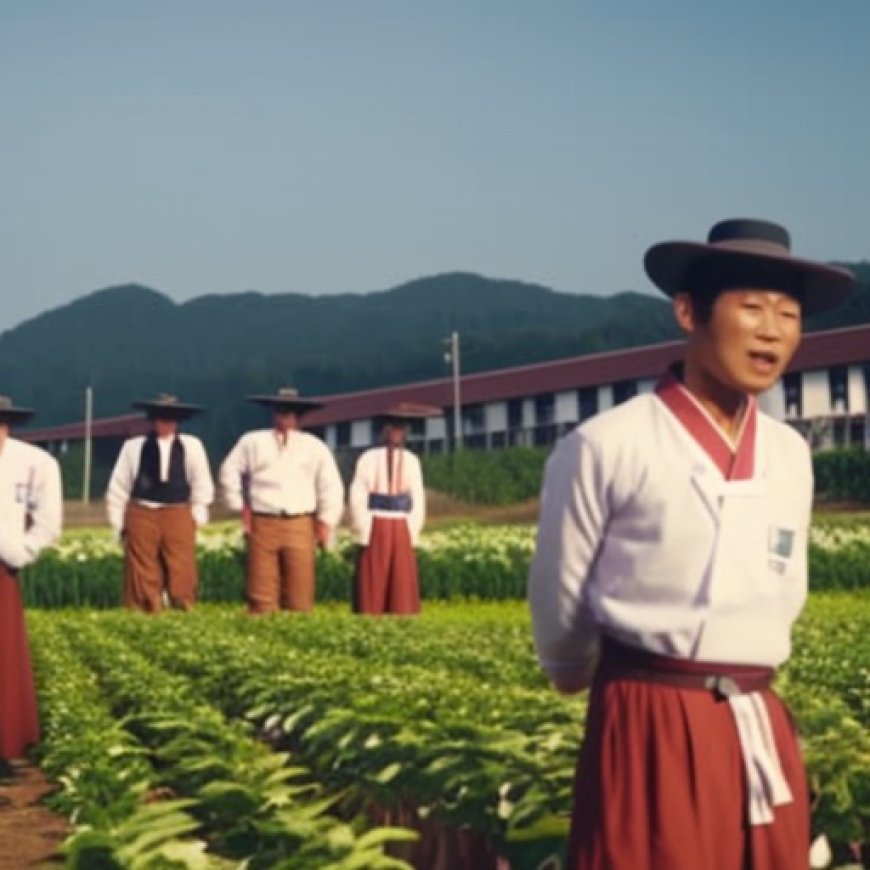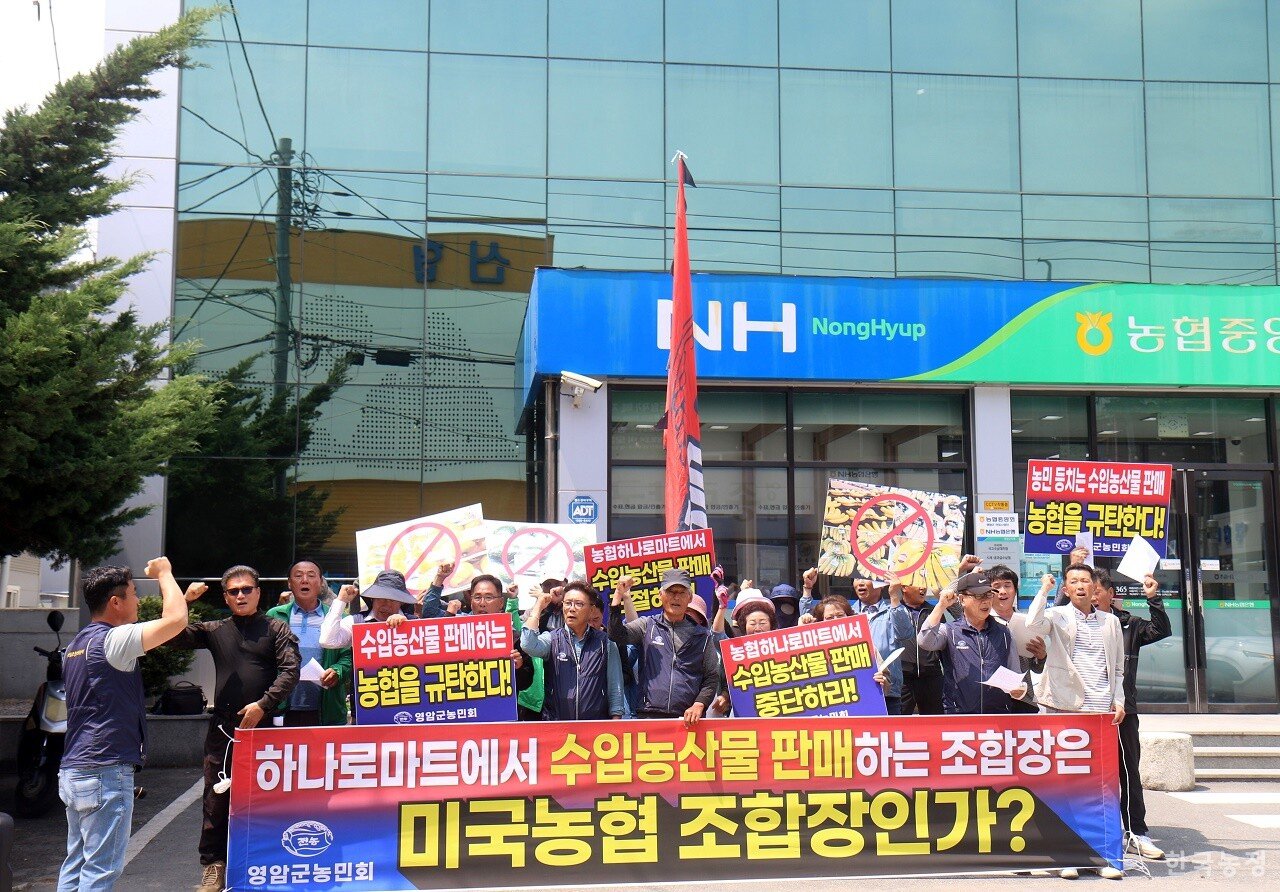Korean Peasant Unions condemn import of agricultural products through Hanaro Mart : Via Campesina
Korean Peasant Unions condemn import of agricultural products through Hanaro Mart Via Campesina


Peasants’ Unions in Korea Protest Sale of Imported Agricultural Products

Peasants’ Unions in Korea are protesting the sale of imported agricultural products by the local agricultural cooperatives, especially by Hanaro Mart. These protests are intensifying across the South Jeolla Province (Jeollanam-do) all the way from Gwangyang at the eastern end to Yeongam at the western end.
Hanaro Mart and Nonghyup
Hanaro Mart is a grocery supermarket chain by Nonghyup (National Agricultural Cooperative Federation), with over 2000 stores across the country that are supposedly meant to sell ‘locally grown agricultural and livestock products.’
Protests in Yeongam County
The Yeongam County Peasants’ Association held a press conference in front of the Yeongam County Branch of the National Agricultural Cooperative Federation (NACF) on the 30th of April. About 50 peasants attended the press conference. Speaking at the conference, Jeong Cheol, the chairperson of Yeongam County Peasants’ Association, said, “It is an undeniable reality in South Korea that, due to the government’s misguided agricultural policies and the climate crisis, whenever there is a possibility of even a slight increase in agricultural product prices, imported agricultural products flood in, destabilizing agricultural product prices and threatening the livelihoods of peasants. It is absolutely unacceptable for the NACF, a cooperative created by peasants, to sell imported agricultural products, which is like stabbing the cooperative members in the back.”
The participants demanded that all imported agricultural products within Hanaro Mart be immediately removed and no longer sold, and the Yeongam County Branch of the NACF strictly monitor Hanaro Mart to ensure that no imported agricultural products are sold. If they are sold, immediate reporting to the central headquarters and suspension of all support to the respective cooperative were demanded. They also delivered a letter to the Yeongam County Branch of the NACF.
Kwon Hyeok-ju, the head of the Yeongam County Peasants’ Association, stated, “Although the Yeongam County Peasants’ Association has protested and warned several times against various agricultural cooperatives selling imported agricultural products at Hanomart within our jurisdiction, the cooperatives only briefly withdrew after receiving the protests, then resumed selling imported agricultural products. We can no longer tolerate this behavior, so we held this press conference as a final warning. If imported agricultural products are sold again at Hanaro Mart after today, we will take immediate retaliatory action without further warning.”
Protests in Gwangyang City
On the 25th of April, the Gwangyang City Peasants’ Association (Chairman Yu Yeong-jun), which raised the banner of this year’s struggle against imported agricultural products at Hanaro Mart for the first time, held another press conference in front of Gwangyangwonhyeop. It was a formal press conference following informal gatherings held in front of Jinjang Cooperative on the 19th and Gwangyang Dongbu Cooperative on the 22nd.
The Gwangyang City Peasants’ Association is conducting two parallel struggles against the local agricultural cooperatives: ‘recovery of shipping incentive funds’ and ‘prevention of the sale of imported agricultural products’. ‘Shipping Incentive Funds’ refer to a 0.5% incentive that is paid by wholesale market to auction companies (which is Nonghyup in this case) to encourage shipping. Peasants want these incentives to be extended to them instead.
The large-scale cooperative struggle that began with the fight for the recovery of shipping incentive funds has expanded to include imported agricultural products. Recently, most of the cooperatives in Gwangyang have withdrawn imported agricultural products from their shelves and are considering payment of shipping incentive funds, but the peasants are demanding a clear resolution.
The press conference was attended by over 50 peasants, including Yoon Il-kwon, the chairperson of the Gwangju Jeonnam Federation of the National Peasants’ Federation, as well as peasants from nearby cities and counties such as Suncheon and Boseong.
Yoon Il-kwon said, “The cooperative is supposed to be an organization for the economic and social advancement of peasants, but the current cooperative has degenerated into a business enterprise, squeezing peasants’ blood and pursuing only its own profit by imposing high fees and loan interest rates on peasants until they die.” The union urged the six cooperatives in Gwangyang City to pay shipping incentive funds and stop selling imported agricultural products.
After the press conference, in a symbolic protest, the participating peasants threw imported bananas at the NACF. The Gwangyang City Peasants’ Association plans to continue pressure on the NACF through picketing and other forms of protest until the issues are resolved.
This article is based on a report filed by Im Sun-man and Kwon Sun-chang for the IKP News.
SDGs, Targets, and Indicators Analysis
1. Which SDGs are addressed or connected to the issues highlighted in the article?
- SDG 2: Zero Hunger
- SDG 8: Decent Work and Economic Growth
- SDG 12: Responsible Consumption and Production
- SDG 17: Partnerships for the Goals
The article discusses issues related to imported agricultural products flooding the local market, destabilizing agricultural prices, and threatening the livelihoods of peasants. These issues are connected to SDG 2, which aims to end hunger, achieve food security, improve nutrition, and promote sustainable agriculture. The article also highlights the economic impact on peasants and the need for fair trade practices, which aligns with SDG 8 on decent work and economic growth. Additionally, the article touches upon responsible consumption and production practices, as well as the importance of partnerships between agricultural cooperatives and peasants, which relate to SDG 12 and SDG 17, respectively.
2. What specific targets under those SDGs can be identified based on the article’s content?
- SDG 2.3: By 2030, double the agricultural productivity and incomes of small-scale food producers, particularly women, indigenous peoples, family farmers, pastoralists, and fishers.
- SDG 8.3: Promote development-oriented policies that support productive activities, decent job creation, entrepreneurship, creativity, and innovation.
- SDG 12.3: By 2030, halve per capita global food waste at the retail and consumer levels and reduce food losses along production and supply chains.
- SDG 17.17: Encourage and promote effective public, public-private, and civil society partnerships, building on the experience and resourcing strategies of partnerships.
Based on the article’s content, the specific targets that can be identified are related to increasing agricultural productivity and incomes of small-scale food producers (SDG 2.3), promoting development-oriented policies for job creation and entrepreneurship (SDG 8.3), reducing food waste and losses in the production and supply chains (SDG 12.3), and fostering partnerships between different stakeholders (SDG 17.17).
3. Are there any indicators mentioned or implied in the article that can be used to measure progress towards the identified targets?
- Indicator for SDG 2.3: Agricultural productivity and income levels of small-scale food producers
- Indicator for SDG 8.3: Job creation rates and entrepreneurship opportunities
- Indicator for SDG 12.3: Reduction in per capita food waste and losses in production and supply chains
- Indicator for SDG 17.17: Number of effective partnerships established between agricultural cooperatives and peasants
The article does not explicitly mention specific indicators, but progress towards the identified targets can be measured using indicators such as agricultural productivity and income levels of small-scale food producers (SDG 2.3), job creation rates and entrepreneurship opportunities (SDG 8.3), reduction in per capita food waste and losses in production and supply chains (SDG 12.3), and the number of effective partnerships established between agricultural cooperatives and peasants (SDG 17.17).
SDGs, Targets, and Indicators Table
| SDGs | Targets | Indicators |
|---|---|---|
| SDG 2: Zero Hunger | 2.3: By 2030, double the agricultural productivity and incomes of small-scale food producers, particularly women, indigenous peoples, family farmers, pastoralists, and fishers. | Agricultural productivity and income levels of small-scale food producers. |
| SDG 8: Decent Work and Economic Growth | 8.3: Promote development-oriented policies that support productive activities, decent job creation, entrepreneurship, creativity, and innovation. | Job creation rates and entrepreneurship opportunities. |
| SDG 12: Responsible Consumption and Production | 12.3: By 2030, halve per capita global food waste at the retail and consumer levels and reduce food losses along production and supply chains. | Reduction in per capita food waste and losses in production and supply chains. |
| SDG 17: Partnerships for the Goals | 17.17: Encourage and promote effective public, public-private, and civil society partnerships, building on the experience and resourcing strategies of partnerships. | Number of effective partnerships established between agricultural cooperatives and peasants. |
Copyright: Dive into this article, curated with care by SDG Investors Inc. Our advanced AI technology searches through vast amounts of data to spotlight how we are all moving forward with the Sustainable Development Goals. While we own the rights to this content, we invite you to share it to help spread knowledge and spark action on the SDGs.
Fuente: viacampesina.org

Join us, as fellow seekers of change, on a transformative journey at https://sdgtalks.ai/welcome, where you can become a member and actively contribute to shaping a brighter future.







